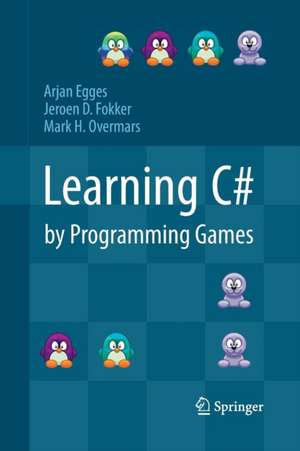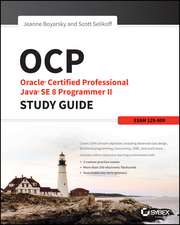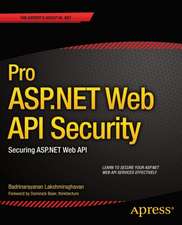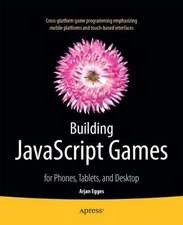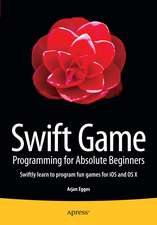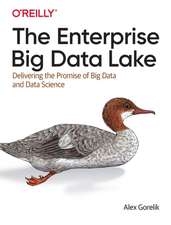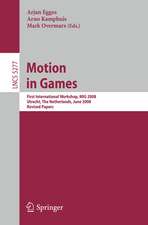Learning C# by Programming Games
Autor Arjan Egges, Jeroen D. Fokker, Mark H. Overmarsen Limba Engleză Paperback – 13 iul 2015
Contrary to most programming books, Egges, Fokker and Overmars do not organize the presentation according to programming language constructs, but instead use the structure and elements of computer games as a framework. For instance, there are chapters on dealing with player input, game objects, game worlds, game states, levels, animation, physics, and intelligence. The reader will be guided through the development of four games showing the various aspects of game development. Starting with a simple shooting game, the authors move on to puzzle games consisting of multiple levels, and conclude the book by developing a full-fledged platform game with animation, game physics, and intelligent enemies. They show a number of commonly used techniques in games, such as drawing layers of sprites, rotating, scaling and animating sprites, showing a heads-up display, dealing with physics, handling interaction between game objects, and creating pleasing visual effects such as snow or glitter. At the same time, they provide a thorough introduction to C# and object-oriented programming, introducing step by step important aspects of programming in general, including many programming constructs and idioms, syntax diagrams, collections, and exception handling.
The book is also designed to be used as a basis for a game-oriented programming course. For each part, there are concluding exercises and challenges, which are generally more complex programming endeavors. Lots of supplementary materials for organizing such a course are available on the accompanying web site http://www.csharpprogramminggames.com, including installation instructions, solutions to the exercises, software installation instructions, game sprites and sounds.
| Toate formatele și edițiile | Preț | Express |
|---|---|---|
| Paperback (1) | 293.98 lei 38-44 zile | |
| Springer – 13 iul 2015 | 293.98 lei 38-44 zile | |
| Hardback (1) | 347.74 lei 43-57 zile | |
| Springer Berlin, Heidelberg – 18 iun 2013 | 347.74 lei 43-57 zile |
Preț: 293.98 lei
Preț vechi: 367.48 lei
-20% Nou
Puncte Express: 441
Preț estimativ în valută:
56.26€ • 58.38$ • 47.02£
56.26€ • 58.38$ • 47.02£
Carte tipărită la comandă
Livrare economică 12-18 martie
Preluare comenzi: 021 569.72.76
Specificații
ISBN-13: 9783642448294
ISBN-10: 3642448291
Pagini: 468
Dimensiuni: 155 x 235 x 29 mm
Greutate: 0.65 kg
Ediția:2013
Editura: Springer
Colecția Springer
Locul publicării:Berlin, Heidelberg, Germany
ISBN-10: 3642448291
Pagini: 468
Dimensiuni: 155 x 235 x 29 mm
Greutate: 0.65 kg
Ediția:2013
Editura: Springer
Colecția Springer
Locul publicării:Berlin, Heidelberg, Germany
Public țintă
Upper undergraduateCuprins
Part
I
Getting
Started.-
Building
Your
First
Game
Application.-
Programming.-
Game
Programming
Basics.-
Creating
a
Game
World.-
Part
II
Creating
Colorful
Games.-
Knowing
what
the
Player
is
Doing.-
Reacting
to
Player
Input.-
Basic
Game
Objects.-
Adding
Interaction.-
A
Limited
Number
of
Lives.-
Organizing
Game
Objects.-
Finishing
the
Game.-
Part
III
Structures
and
Patterns.-
Collections
of
Game
Objects.-
Fullscreen
Games.-
Game
Objects
in
a
Structure.-
Redesigning
the
Game
World.-
Gameplay
Programming.-
Game
States.-
Finishing
the
Game.-
Part
IV
Making
Your
Games
Appealing.-
Sprite
Sheets.-
Menus
and
Settings.-
Game
State
Management.-
Loading
Levels
from
Files.-
Pairing
the
Penguins.-
Finishing
the
Game.-
Part
V
Animation
and
Complexity.-
Creating
the
Main
Game
Structure.-
Animation.-
Game
Physics.-
Intelligent
Enemies.-
Adding
Player
Interaction.-
Finishing
the
Game.
Notă biografică
Arjan
Eggesis
an
associate
professor
in
the
Games
and
Virtual
Worlds
group
in
the
Department
of
Information
and
Computing
Sciences
at
Utrecht
University
in
the
Netherlands.
Heading
the
Motion
Capture
Lab
there,
his
current
research
focuses
on
the
integration
of
motion
capture
animation
into
navigation
and
object
manipulation
tasks.
He
regularly
teaches
various
courses
related
to
games
and
computer
animation,
and
recently
designed
the
new
introductory
programming
course
for
the
university’s
new
Game
Technology
bachelor
program,
using
C#
as
the
language
of
choice.
Jeroen Fokkeris an assistant professor in the Software Technology group at Utrecht University. As the director of education, he is responsible for the undergraduate programs in Computer Science and Information Science. He has been teaching introductory programming courses for over 20 years, using C++, Haskell, Java, and C#, as well as courses on compiler construction.
Mark H. Overmarsis a full professor in computer science at Utrecht University. Here he has done research into computational geometry, robotics, and game technology. Mark is responsible for the Game Technology educational program at Utrecht University. Furthermore, he is the author of the Game Maker software package, originally designed as a tool to teach children about the basics of object-oriented design and to raise their interest in computer science. The package, though, has developed into a full-blown authoring package for games used in education by amateurs and by professional game developers. Mark was named as one of the top 50 influential people in game development by the U.S. magazine GameDeveloper in 2010.
Jeroen Fokkeris an assistant professor in the Software Technology group at Utrecht University. As the director of education, he is responsible for the undergraduate programs in Computer Science and Information Science. He has been teaching introductory programming courses for over 20 years, using C++, Haskell, Java, and C#, as well as courses on compiler construction.
Mark H. Overmarsis a full professor in computer science at Utrecht University. Here he has done research into computational geometry, robotics, and game technology. Mark is responsible for the Game Technology educational program at Utrecht University. Furthermore, he is the author of the Game Maker software package, originally designed as a tool to teach children about the basics of object-oriented design and to raise their interest in computer science. The package, though, has developed into a full-blown authoring package for games used in education by amateurs and by professional game developers. Mark was named as one of the top 50 influential people in game development by the U.S. magazine GameDeveloper in 2010.
Textul de pe ultima copertă
C#
is
the
language
of
choice
for
learning
how
to
program.
It
is
a
very
well
structured
object-oriented
language
and
avoids
some
of
the
problems
of
Java.
An
excellent
free
programming
environment
is
available
for
C#,
as
well
as
a
game
programming
framework.
And
(if
necessary)
moving
from
C#
to
C++
is
easy.
Developing computer games is a perfect way to learn how to program in modern programming languages. This book teaches how to program in C# through the creation of computer games – and without requiring any previous programming experience.
Contrary to most programming books, Egges, Fokker and Overmars do not organize the presentation according to programming language constructs, but instead use the structure and elements of computer games as a framework. For instance, there are chapters on dealing with player input, game objects, game worlds, game states, levels, animation, physics, and intelligence. The reader will be guided through the development of four games showing the various aspects of game development. Starting with a simple shooting game, the authors move on to puzzle games consisting of multiple levels, and conclude the book by developing a full-fledged platform game with animation, game physics, and intelligent enemies. They show a number of commonly used techniques in games, such as drawing layers of sprites, rotating, scaling and animating sprites, showing a heads-up display, dealing with physics, handling interaction between game objects, and creating pleasing visual effects such as snow or glitter. At the same time, they provide a thorough introduction to C# and object-oriented programming, introducing step by step important aspects of programming in general, including many programming constructs and idioms, syntax diagrams, collections, and exception handling.
The book is also designed to be used as a basis for a game-oriented programming course. For each part, there are concluding exercises and challenges, which are generally more complex programming endeavors. Lots of supplementary materials for organizing such a course are available on the accompanying web site http://www.csharpprogramminggames.com, including installation instructions, solutions to the exercises, software installation instructions, game sprites and sounds.
Developing computer games is a perfect way to learn how to program in modern programming languages. This book teaches how to program in C# through the creation of computer games – and without requiring any previous programming experience.
Contrary to most programming books, Egges, Fokker and Overmars do not organize the presentation according to programming language constructs, but instead use the structure and elements of computer games as a framework. For instance, there are chapters on dealing with player input, game objects, game worlds, game states, levels, animation, physics, and intelligence. The reader will be guided through the development of four games showing the various aspects of game development. Starting with a simple shooting game, the authors move on to puzzle games consisting of multiple levels, and conclude the book by developing a full-fledged platform game with animation, game physics, and intelligent enemies. They show a number of commonly used techniques in games, such as drawing layers of sprites, rotating, scaling and animating sprites, showing a heads-up display, dealing with physics, handling interaction between game objects, and creating pleasing visual effects such as snow or glitter. At the same time, they provide a thorough introduction to C# and object-oriented programming, introducing step by step important aspects of programming in general, including many programming constructs and idioms, syntax diagrams, collections, and exception handling.
The book is also designed to be used as a basis for a game-oriented programming course. For each part, there are concluding exercises and challenges, which are generally more complex programming endeavors. Lots of supplementary materials for organizing such a course are available on the accompanying web site http://www.csharpprogramminggames.com, including installation instructions, solutions to the exercises, software installation instructions, game sprites and sounds.
Caracteristici
Unique
combined
presentation
of
general
programming
techniques
and
computer
game
development,
organized
along
the
structure
of
games
Additional website http://www.csharpprogramminggames.com with numerous exercises, solutions, and ready-to-use game assets (like e.g. sprites and sounds)
Readers will see various fascinating games of growing complexity
All tools needed to program and replay the games are freely available
All authors are highly experienced in teaching and game programming, Mark Overmars was named as one of the top 50 influential people in game development by the U.S. magazineGameDeveloperin 2010
Additional website http://www.csharpprogramminggames.com with numerous exercises, solutions, and ready-to-use game assets (like e.g. sprites and sounds)
Readers will see various fascinating games of growing complexity
All tools needed to program and replay the games are freely available
All authors are highly experienced in teaching and game programming, Mark Overmars was named as one of the top 50 influential people in game development by the U.S. magazineGameDeveloperin 2010
Descriere
Requiring
no
programming
experience,
this
book
teaches
game
programming
and
the
C#
language.
It
discusses
basic
game
structure,
player
input,
game
objects,
game
worlds,
levels,
animation,
physics
and
intelligence,
guiding
the
reader
to
create
playable
games.
